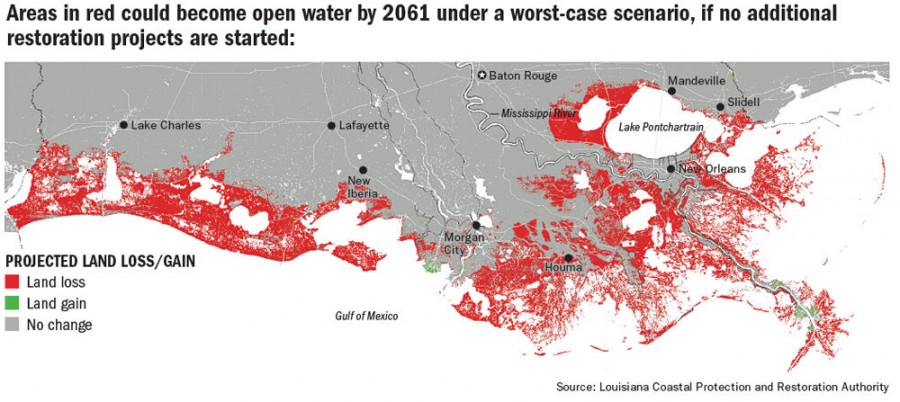Coastal Master Plan underfunded, lacks promise
The Louisiana Coastal Protection and Restoration Authority unanimously approved the 2017 Coastal Master Plan on April 19, designating a budget of $50 billion for the 50-year process. This plan comes at the same time as possible cuts to the Environmental Protection Agency’s budget under President Donald Trump and continued grief over Louisiana’s budget deficit.
To preserve the environment, government efforts to slow coastal land loss should be scrutinized, and industrial growth in the region should be protested adamantly. As covered earlier this year, Tulane itself is at risk of having to relocate within the next century.

The 2017 plan builds upon a 2012 plan and covers the protection of 20 parishes. It details restoration projects, including sediment diversions and barrier island reconstruction, structural projects such as new levee construction and non-structural risk reduction projects. The latter comprises flood insurance and elevation projects to protect private property and dampen the high expected property costs in upcoming years.
Non-structural projects make up only $6 billion of the massive budget. Some, including representatives from the environmental organization The Sierra Club, argue that these expenditures are insufficient for the number of people whose homes and livelihoods are at risk and are calling for an increase to $10 billion. While this is a reasonable argument, the main problem stems not from the money’s intended target but from its source.
Fifty billion dollars is a reasonable sum to pay more than 50 years in the interest of preserving critically at-risk land. Industries such as fishing and the thousands of jobs they support are in jeopardy. Seventy-five percent of commercial fish and shellfish in the region rely on wetlands for survival. Oil and gas are also threatened, meaning that damage to physical property is not the only concern. Unfortunately, Louisiana is currently unable to cover these costs, even with federal support.
Louisiana’s state budget allocates only $20 billion toward coastal preservation. Worse still, the Tulane Institute on Water Resources Law and Policy estimates that the full cost of the work will end up at $91.7 billion even when accounting for inflation. Without direct intervention from federal authorities or private institutions, the plan cannot be executed to its fullest extent.
At this point, the best option for funding the plan may be to turn to funding from the federal government and the Department of Defense. The 2015 National Security Strategy states: “Climate change is an urgent and growing threat to our national security … Increased sea levels and storm surges threaten coastal regions, infrastructure, and property.” One possible bipartisan solution involves redirecting a portion of DOD funding toward combating coastal land loss, which would not require a military budget cut.
Another remedy would be for Trump to declare coastal land loss a national emergency, expediting restoration efforts. The president did promise an aggressive infrastructure plan. His administration, however, has downplayed the importance of environmental issues, having already signaled its intent to cut funding to the EPA. As a result, Louisiana may not receive executive-backed support in the next four years.
For the ordinary Tulane student, fighting coastal erosion means being aware of it. Coastal conditions have deteriorated to such an extent that the situation is accurately being called an emergency. Some are pushing to sue big oil companies for damages they have caused to marshlands, but these efforts, even if successful, still will not cover the costs of restoration or those of restricting environmentally harmful industry. At the individual level, volunteers can clean up coastlines, contribute to barrier construction and boycott environmentally harmful firms.
If you are not from Louisiana, remember that others do not have the option to leave. In the interest of preserving this ecologically unique, diverse and beautiful region, write to your representatives, regardless of your home state.
It is fair to call this a national emergency. Write to your representative, urge them to defend Louisiana coastal wetlands and then write again.
This is an opinion article and does not reflect the views of The Tulane Hullabaloo. Kathryne is a senior at Newcomb-Tulane College. They can be reached at klebell@tulane.edu.
Your donation will support the student journalists of Tulane University. Your contribution will allow us to purchase equipment and cover our annual website hosting costs.



